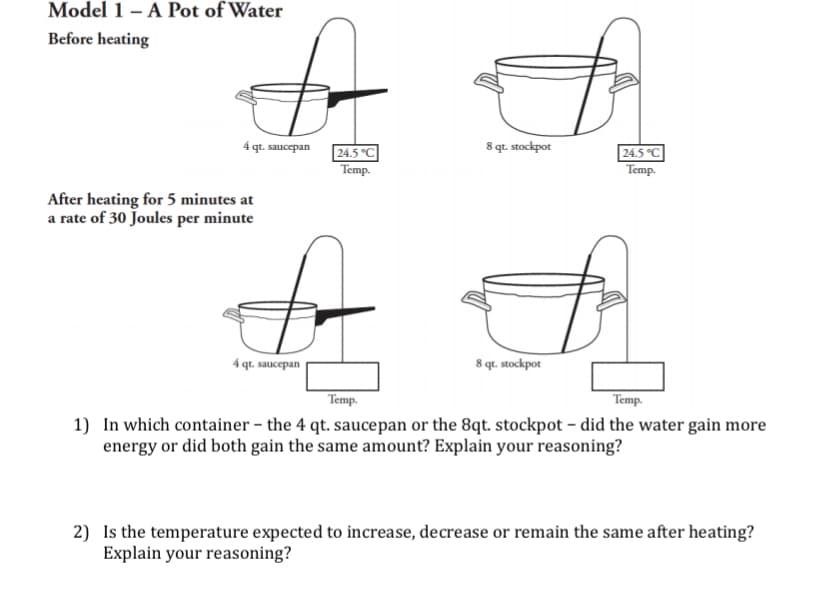Before heating 4 qt. saucepan 8 qt. stockpot 24.5 °C Temp. 24.5 °C Temp. After heating for 5 minutes at a rate of 30 Joules per minute 4 qt. saucepan 8 qt. stockpot Temp. Temp. 1) In which container - the 4 qt. saucepan or the 8qt. stockpot – did the water gain more energy or did both gain the same amount? Explain your reasoning? 2) Is the temperature expected to increase, decrease or remain the same after heating? Explain your reasoning?
Before heating 4 qt. saucepan 8 qt. stockpot 24.5 °C Temp. 24.5 °C Temp. After heating for 5 minutes at a rate of 30 Joules per minute 4 qt. saucepan 8 qt. stockpot Temp. Temp. 1) In which container - the 4 qt. saucepan or the 8qt. stockpot – did the water gain more energy or did both gain the same amount? Explain your reasoning? 2) Is the temperature expected to increase, decrease or remain the same after heating? Explain your reasoning?
Chemistry
10th Edition
ISBN:9781305957404
Author:Steven S. Zumdahl, Susan A. Zumdahl, Donald J. DeCoste
Publisher:Steven S. Zumdahl, Susan A. Zumdahl, Donald J. DeCoste
Chapter1: Chemical Foundations
Section: Chapter Questions
Problem 1RQ: Define and explain the differences between the following terms. a. law and theory b. theory and...
Related questions
Question
Please help me complete question 1 and 2

Transcribed Image Text:Model 1 – A Pot of Water
Before heating
4 qt. saucepan
8 qt. stockpot
24.5 °C
Temp.
24.5 °C
Temp.
After heating for 5 minutes at
a rate of 30 Joules per minute
4 qt. saucepan
8 qt. stockpot
Temp.
Temp.
1) In which container - the 4 qt. saucepan or the 8qt. stockpot – did the water gain more
energy or did both gain the same amount? Explain your reasoning?
2) Is the temperature expected to increase, decrease or remain the same after heating?
Explain your reasoning?
Expert Solution
This question has been solved!
Explore an expertly crafted, step-by-step solution for a thorough understanding of key concepts.
This is a popular solution!
Trending now
This is a popular solution!
Step by step
Solved in 2 steps

Knowledge Booster
Learn more about
Need a deep-dive on the concept behind this application? Look no further. Learn more about this topic, chemistry and related others by exploring similar questions and additional content below.Recommended textbooks for you

Chemistry
Chemistry
ISBN:
9781305957404
Author:
Steven S. Zumdahl, Susan A. Zumdahl, Donald J. DeCoste
Publisher:
Cengage Learning

Chemistry
Chemistry
ISBN:
9781259911156
Author:
Raymond Chang Dr., Jason Overby Professor
Publisher:
McGraw-Hill Education

Principles of Instrumental Analysis
Chemistry
ISBN:
9781305577213
Author:
Douglas A. Skoog, F. James Holler, Stanley R. Crouch
Publisher:
Cengage Learning

Chemistry
Chemistry
ISBN:
9781305957404
Author:
Steven S. Zumdahl, Susan A. Zumdahl, Donald J. DeCoste
Publisher:
Cengage Learning

Chemistry
Chemistry
ISBN:
9781259911156
Author:
Raymond Chang Dr., Jason Overby Professor
Publisher:
McGraw-Hill Education

Principles of Instrumental Analysis
Chemistry
ISBN:
9781305577213
Author:
Douglas A. Skoog, F. James Holler, Stanley R. Crouch
Publisher:
Cengage Learning

Organic Chemistry
Chemistry
ISBN:
9780078021558
Author:
Janice Gorzynski Smith Dr.
Publisher:
McGraw-Hill Education

Chemistry: Principles and Reactions
Chemistry
ISBN:
9781305079373
Author:
William L. Masterton, Cecile N. Hurley
Publisher:
Cengage Learning

Elementary Principles of Chemical Processes, Bind…
Chemistry
ISBN:
9781118431221
Author:
Richard M. Felder, Ronald W. Rousseau, Lisa G. Bullard
Publisher:
WILEY